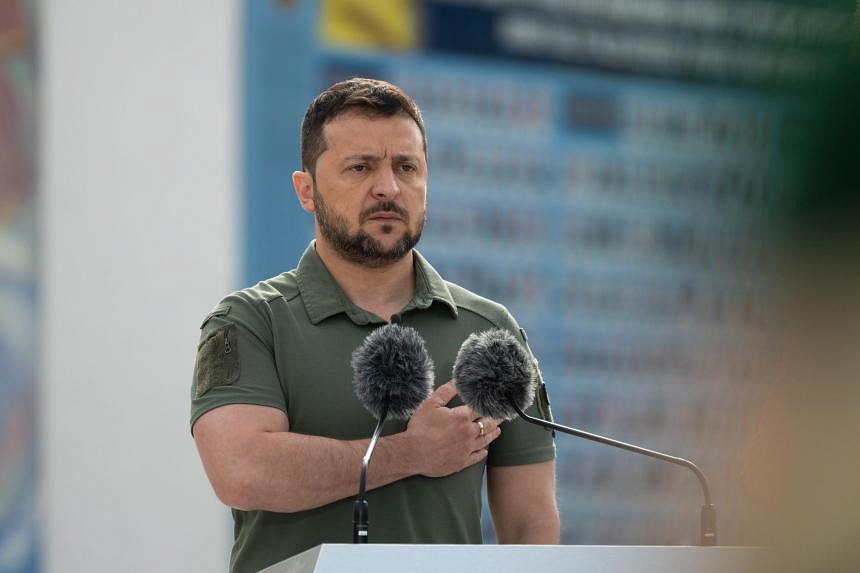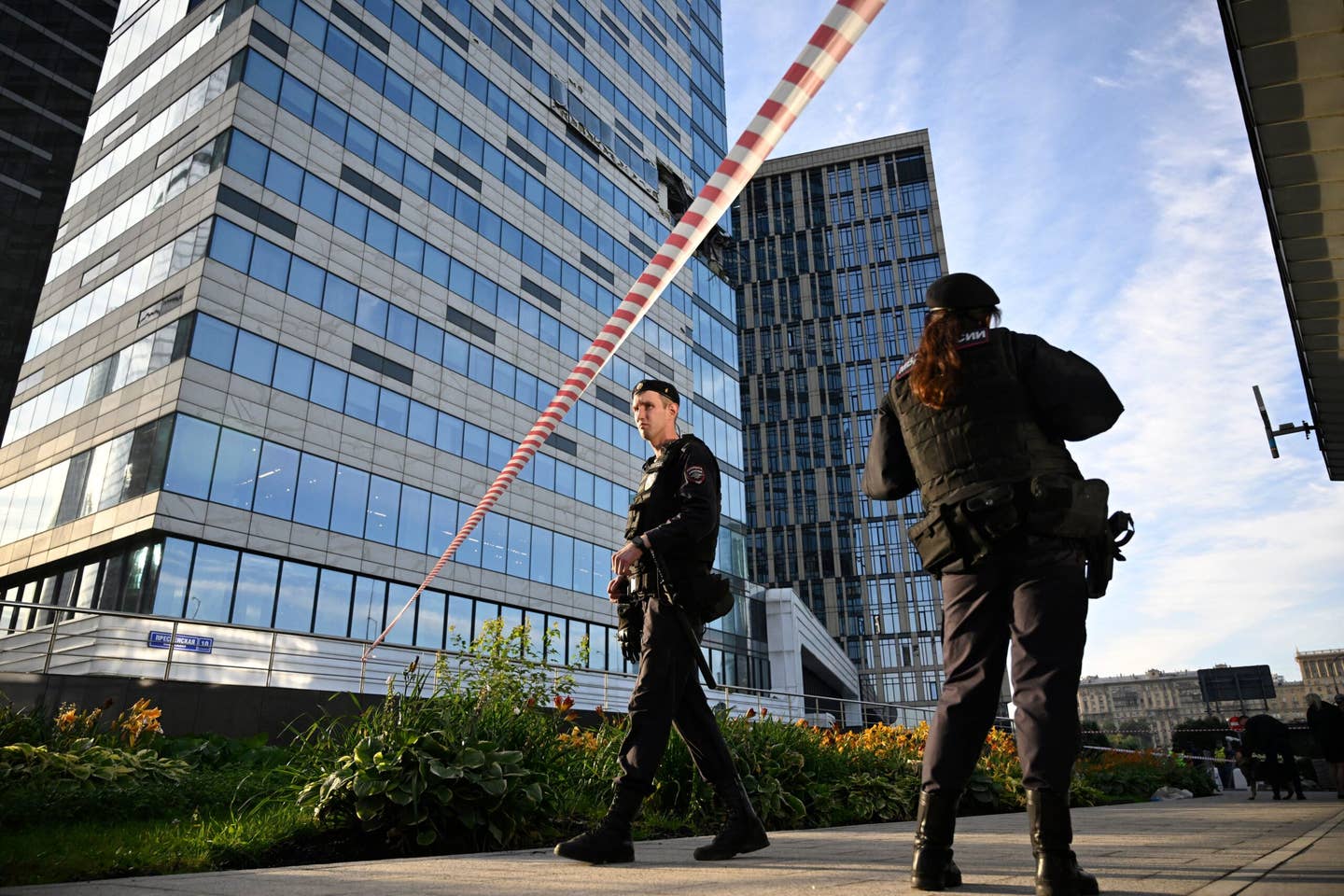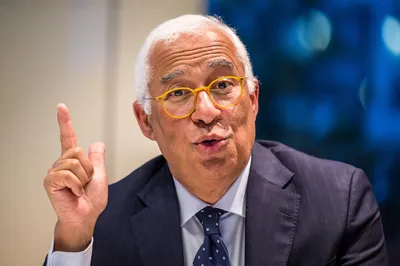After Latest Moscow Strike, Zelensky Warns Drone War Is Coming To Russia
Long-range drone strikes on Moscow are increasing in frequency and Ukraine’s leadership is talking more openly about them.
Ukrainian President Volodymyr Zelensky responded to the latest drone strike to hit targets in Moscow with a warning of further attacks on Russian territory, including military infrastructure. Zelensky refrained from accepting full responsibility for yesterday’s drone attack on the Russian capital, but Ukrainian officials are increasingly referring more explicitly to these events, which have stepped up notably in recent weeks, with four waves having struck the capital region this month.
“Gradually, the war is returning to the territory of Russia — to its symbolic centers and military bases,” Zelensky said, in his nightly video address on Sunday. “This is an inevitable, natural, and absolutely fair process,” the Ukrainian leader added.
The warning came after the latest drone attack on Russia’s capital region that occurred on Saturday night.
According to the Russian Ministry of Defense, three drones were shot down over Moscow, in what the ministry described as an “attempted terrorist attack by the Kyiv regime.”
The Russian Ministry of Defense states that one of the drones was shot down by air defenses over the Odintsovo district, a western suburb of Moscow. As The War Zone has reported in the past, ground-based air defenses in central Moscow have been beefed up, including positioning Pantsir gun/missile short-range air defense systems on the roof of the defense ministry, as well as other buildings.
The other two are said to have crashed into the Moscow City business district, the same source claiming that these vehicles had been jammed before they came down.
Photos and video showed one of the drones slamming into a modern skyscraper, the IQ-Quarter, which is less than 3.5 miles from the Kremlin. The impact and detonation of that drone tore off part of the skyscraper’s facade and smashed windows, leaving the building burning and debris strewn across the street below.
According to Russia’s state-run TASS news agency, which cited emergency officials, one security guard was injured in the strike on the IQ-Quarter.
It’s unclear if the drone was intended to hit the IQ-Quarter, or whether, in line with the Russian Ministry of Defense’s account, the vehicle was brought down short of its target by electronic jamming. However, the state-run RIA-Novosti news agency reported that the building’s tenants included several government agencies. Jamming of drones attacking the Russian capital is something that has also been reported in the past, as evidenced in the tweet below.
As a result of the drone strikes, commercial flights were temporarily suspended in and out of Moscow’s Vnukovo Airport, while the airspace over Moscow and surrounding regions was temporarily closed. This is now a routine response to attacks of this kind in the capital region.
At this stage, it’s unclear what type of drones were used in the latest attack on central Moscow, although there has been recent speculation about the use of a locally developed type named Bober (meaning Beaver), which you can read more about here. This drone, with its characteristic canard configuration, was apparently used in the July 24 raid on Moscow as well as in the earlier multi-drone attack on the Russian capital on May 30.
While Ukrainian officials didn’t directly acknowledge responsibility for the drone attacks over the weekend, Zelensky’s barely veiled reference to them was notable. Earlier drone strikes on Russian territory were often met with no comment at all from the Ukrainian authorities.
Yurii Ihnat, a spokesman for the Ukrainian Air Force, said that the raid on Moscow was a consequence of Russia’s full-scale invasion of Ukraine.
“All of the people who think the war ‘doesn’t concern them’ — it’s already touching them,” Ihnat said yesterday. “There’s already a certain mood in Russia: that something is flying in, and loudly. There’s no discussion of peace or calm in the Russian interior anymore. They got what they wanted,” he added.
Meanwhile, there is no doubt that Ukraine and/or Ukrainian interests are behind the attacks, which have become a more regular occurrence, especially targeting the Russian capital, in parallel with Kyiv’s counteroffensive launched in June against Russian forces on Ukrainian territory.
Previous drone strikes on Moscow include the dramatic incident on May 3 that targeted the Kremlin itself. On that occasion, as we reported at the time, President Zelensky actually denied his country’s involvement. Nevertheless, the raid was a significant statement of intent, revealing the vulnerability of Russia’s center of power to attacks by slow and low-flying drones.
A more complex drone strike on Moscow followed on May 30, this time involving multiple uncrewed aerial vehicles. While it’s unclear exactly how many drones were involved and whether any reached their intended targets, Baza, a Telegram channel with links to the Russian security services, said that more than 25 Ukrainian drones were used. The Russian Ministry of Defense claimed that eight drones were shot down or otherwise diverted from their intended targets.
This month, meanwhile, has seen a relative spike in drone attacks on the Russian capital region. There have been reports of four such raids, including on July 24, when two drones struck central Moscow, causing damage to two non-residential buildings. As you can read about in our coverage of that attack, one of the buildings hit was around 1.2 miles from the Russian Ministry of Defense’s headquarters. That wave of attacks was unusual in that they came after President Zelensky promised what he called “a retaliation to Russian terrorists for Odesa,” after the Kremlin’s forces struck the Ukrainian port city repeatedly in recent days.
While the various drone strikes on the capital region have not been notably effective in terms of damage or lethal in terms of human casualties, they send an obvious signal about Moscow’s vulnerability to these kinds of air attacks. Each time a building in the capital is hit, whatever the level of destruction, it serves as a significant propaganda coup for Ukraine.
It’s also noteworthy, on this occasion, that President Zelensky has not only referred much more explicitly to the drone attacks than in the past but also that he has highlighted the apparent threat of similar attacks on “symbolic centers and military bases” in the future.
Military bases, specifically airfields, on Russian territory have come under attack in the past, as well, with mixed results. These have come under attack from a variety of different weapons, allegedly including short-range ballistic missiles, teams of saboteurs, and also adapted Cold War-era target drones carrying warheads on one-way missions. In addition, more familiar ‘suicide drone’ attacks have apparently been directed against military infrastructure, including airbases, on Russian territory.
In fact, only last week, it was reported that Russia is seeking to establish a second airbase for its fleet of Tu-160 Blackjack strategic bombers, in the Far East of the country. While this is clearly tied to the expanding Tu-160 force, it seems possible that the vulnerability of Russian Long-Range Aviation bases in the west of the country is also driving a rethink of how these critical assets should be deployed for their own protection.
In addition, of course, there have been many Ukrainian drone strikes against Russian-occupied Crimea, with both uncrewed aerial vehicles and uncrewed surface vessels having been used repeatedly.
It remains to be seen what kind of reaction the latest drone attack against Moscow will bring from Russia, although its authorities have, in the past, promised revenge for these kinds of raids.
In response to the drone strike against Moscow on July 24, Dmitry Medvedev, the deputy chairman of Russia’s Security Council, issued a dark warning of Russia expanding into new types of target sets to hit back at Kyiv.
“We also need to select non-standard targets for our strikes, not just storage sites, energy hubs, and oil bases, the TASS news agency reported Medvedev as saying. “There are other places where nobody would be expecting us and where strikes would have a widely felt impact,” he added.
Whatever happens, it appears inevitable that Russia will face more attacks of this type, with President Zelensky’s warning coming only a week after similar statements from Ukraine’s Deputy Prime Minister Mykhailo Fedorov. In response to a drone attack on Crimea, Fedorov took to the Telegram messaging app to say: “No matter what happens there will be more of this.”
As time goes on and Ukraine's expertise in unmanned aerial vehicles expands, both in capabilities and volume of production, the problem could compound for Moscow. We have already seen the shift away from fixed-wing drones available to the public turned into improvised weapons to purpose-built very long-range types. Then the real question becomes can Russia's air defenses adapt fast enough to such a threat, especially if it begins showing up more frequently in greater volumes? Given what we've seen so far, that seems unlikely.
All this is about bringing the war home to the Russian people and putting pressure on the Putin regime. Exactly how successful that will be is still unclear, but we are likely seeing just a glimpse of what's to come.
Contact the author: thomas@thewarzone.com





No comments:
Post a Comment